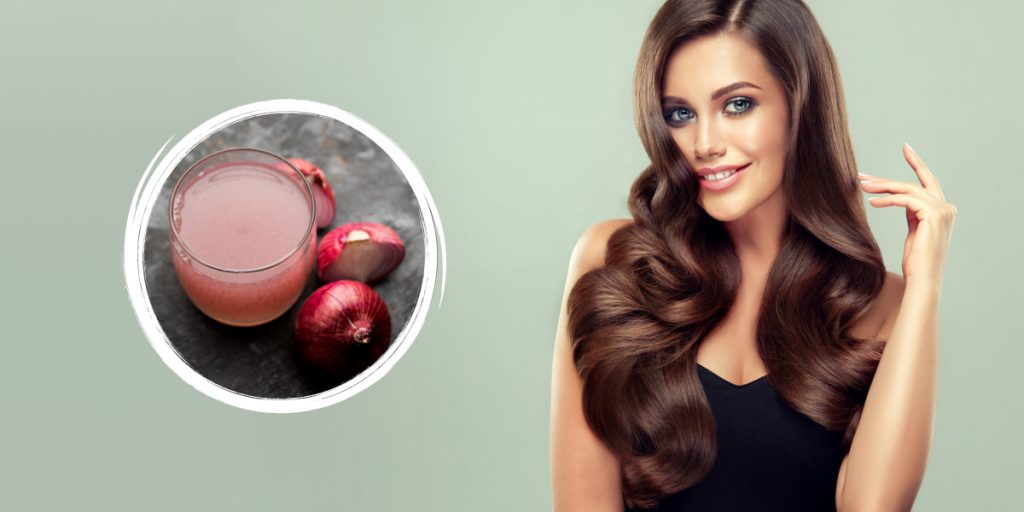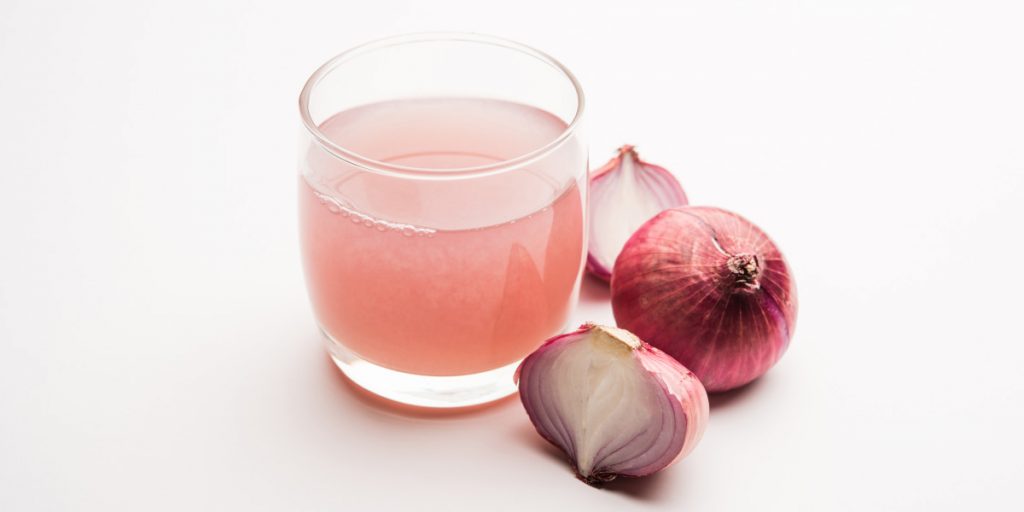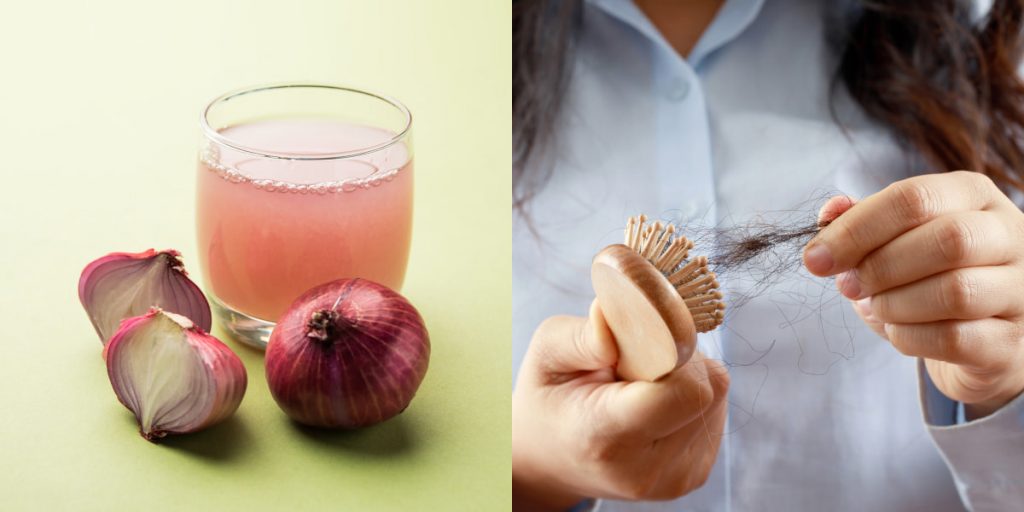Published on December 12th, 2022
Last updated on January 24th, 2023
How To Use Onion For Hair Growth? Onion Juice To Prevent Hair Loss

If you are suffering from hair loss on your head, you have probably tried many means to solve this problem. Your arsenal should already have included both natural remedies and medications. However, did you get the desired effect after using these products? Even if all your attempts have been unsuccessful, now is not the best time to despair. So, we have a possible solution to your problem.
It would be best to consider using onion to grow your hair and prevent hair loss. This natural remedy has many advantages and minimal negative effects and is quite cheap and available in almost every store.
Continue reading our article until the end to know every nuance of using a hair onion to make your curls shiny and thick again.
Applying Onion Juice For Hair Growth

Onion juice can be an effective way to improve hair growth when used correctly. Before applying onion juice to the scalp, it is essential to prepare both the hair and skin by diluting the juice and shampooing/conditioning the hair.
In this block, we’ll walk you through how to properly apply onion juice to your hair, the key aspects of using a hair product, and some tips on how to prepare an onion for your hair.
The final result will depend on how well you use the product for your hair. So, with proper hair care, using quality natural products, and observing the body’s reaction to onion water, you can increase your chances of success in caring for your hair.
Prepare The Hair And Skin
Using onion water for the scalp can be an effective way to improve hair growth. Onion is rich in sulfur, which is necessary for producing collagen. Collagen is responsible for the elasticity of the skin, and it also plays a role in hair growth. In addition, onion juice can help to improve blood circulation to the scalp, which can also promote hair growth.
Before applying onion juice to the scalp, preparing both the hair and the skin is essential. Onions contain a high amount of acidity, which can irritate the skin. To avoid this, it is vital to mix the onion juice with water or another liquid before applying it to the scalp.
It is also important to shampoo and conditions the hair before applying onion juice, as this will help to protect the hair from damage.
Prepare The Onion Juice For Hair Growth
There are several recipes for onion juice; however, although their recipes differ, the benefits of onions are mostly the same. Here are a few solutions for your hair that you can prepare in your home:
- Cut a red onion in half. Rub the onion on the areas of hair loss for a minute, and then massage these spots for a minute. The best option for hair is to leave it like this overnight and wash off the onion juice with water.
- Another option would be to take a couple of onions and put them in a blender. After using the blender, you should have onion puree. Then you should strain the onion juice through the cheesecloth. Then you need to apply onion juice on your head and let it soak in. Leave the onion juice on your head for at least 30 minutes. After that, you can wash your curls with shampoo.
- If you want a solution for your hair and do not have a bad smell after use, you can combine onion juice with other oils. So, coconut oil, olive oil, and castor oil can be great options. However, in any case, after using a mix of onion juice and oils, you will still need to wash your hair with shampoo.
Apply The Onion To The Hair
The general recommendations for applying onion juice to hair are quite simple. You must have clean hair before the procedure, apply onion juice to the skin only if you do not have allergies and irritations, and keep onion juice on your head for at least 30 minutes. After the procedure, wash off the product with water or wash your hair with shampoo.
After The Procedure
After an onion hair treatment, you should pay attention to the condition of the hair and skin in the places where you applied the product. Pay attention to whether you have rashes, itching, or redness in places where onion juice is. You should stop using onion juice for hair if a negative effect appears.
If everything is right, you can continue applying the product to your hair and wait for a positive result. However, remember that using only onions is not a panacea; you should also take care of your hair and scalp regularly, apply oils and conditioners, and wash and dry your hair correctly.
Benefits Of Onion Juice For Hair Loss

For centuries, onion has been used as a remedy for various ailments. Only recently have people realized the benefits of onion for hair.
Let’s take a closer look at how onion can benefit your hair.
| Sulfur for stronger hair | Sulfur is an essential mineral for hair growth. It helps improve blood circulation to the scalp and encourages collagen production. Collagen is a protein that gives your hair its strength and elasticity. When used topically, sulfur can also help to treat dandruff and other scalp conditions. |
| Manganese for faster hair growth | Manganese is another mineral that is essential for hair growth. It helps the body to absorb other nutrients, such as sulfur, more effectively. Manganese also helps to produce keratin, a protein that makes up your hair (and nails). |
| Zinc for a healthy scalp | Zinc is essential for maintaining a healthy scalp. Zinc helps to control the production of oil in the scalp and can also help to treat dandruff. In addition, zinc has anti-inflammatory properties and can help to soothe an itchy or irritated scalp. |
| Onion is anti-bacterial, and anti-fungal | Onion has anti-bacterial and anti-fungal properties, which makes it effective in treating scalp infections that can cause hair loss. Scalp infections are often caused by bacteria or fungi that enter the body through small cuts or abrasions on the skin. If you’re suffering from hair loss, try applying onion juice to your scalp 2-3 times per week. You should see a noticeable difference within a few weeks. |
Side Effects Of Onion Juice On Hair
While onions can provide many benefits for your hair, they can also be harmful. Let’s look at some of the downsides of onion for hair.
| Irritation | Onion is a potent ingredient that can irritate if not used properly. Be sure to do a patch test before applying onion juice to your scalp, and if you experience any irritation, discontinue use immediately. |
| Onion can be dirty | In addition, another side effect of onion juice on hair is that it can temporarily stain your skin and clothing. Wear old clothes or a shower cap when applying it to your hair. |
| Smell | Another potential drawback of using onion for hair is the smell. Onion has a strong, pungent odor that some people find unpleasant. If you’re worried about the smell, try adding a few drops of essential oil to the onion juice before applying it to your hair. |
Conclusion
Onion juice is a popular remedy for hair loss. Some people apply it directly to the scalp, while others add it to shampoo or other hair products. There is no scientific evidence to support these claims, but many people report success in using onion juice for hair growth.
If you’re interested in trying it, consult your healthcare provider to ensure safety and effectiveness.
FAQ
Can I Use Onion Juice On My Scalp If I Have Dandruff?
Onion juice can help to treat dandruff. Apply the juice to your scalp and leave it on for about 30 minutes before shampooing.
Will Using Onion Juice Make My Hair Smell Bad?
Yes, onions have a strong scent that will likely transfer to your hair. To avoid this, try adding a few drops of essential oil to the onion juice before applying it to your hair.
How Often Should I Use Onion Juice For Hair Growth?
There is no definitive answer, but many recommend using it two or three times per week for the best results.
Is There Anything Else I Can Do To Promote Hair Growth?
In addition to using onion juice, you can also try other natural remedies like coconut oil or aloe vera. You can also eat foods rich in vitamins and minerals for healthy hair, such as salmon, spinach, and eggs. If you’re concerned about hair loss, discuss other potential causes and treatment options with your healthcare provider.


